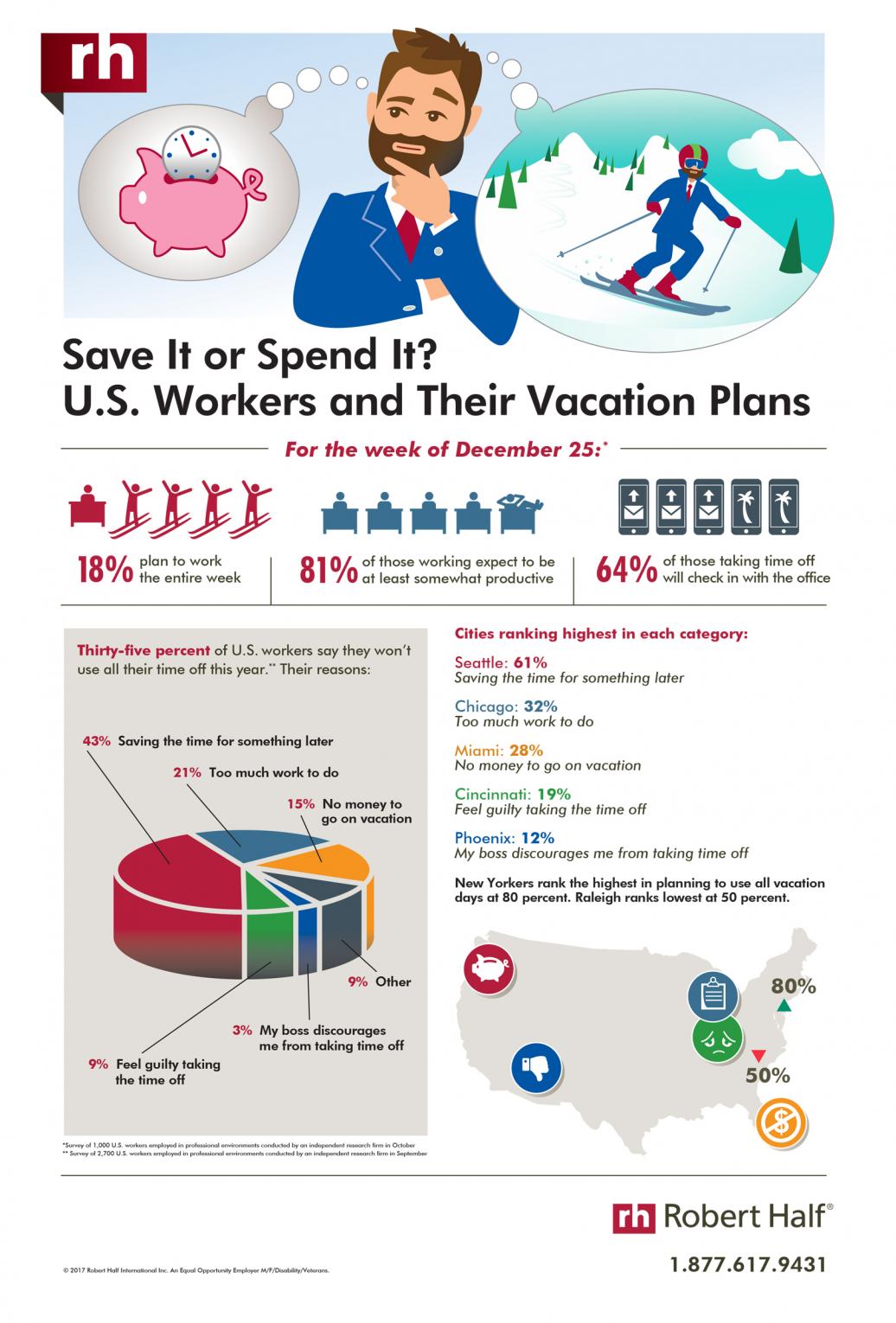U.S. workers will not leave work very far behind – if at all – during the week of December 25, according to Robert Half’s holiday survey. Eighteen percent of workers plan to work the entire week. Of the 67 percent of workers who will take at least part of Christmas week off, 64 percent will check in with the office while they’re out.
One-third of employees plan to take the entire week off. Sixty-one percent of this group say it’s because their organization closes for the week; 79 percent of them note their firm pays employees during the closure. For people who plan to work, 81 percent expect to be at least somewhat productive. More than 1,000 people throughout the country were surveyed in October.
Does the end of the year mean workers reach a zero balance on vacation time? Not necessarily, according to a separate Robert Half survey of 2,700 people from 27 major U.S. cities. Thirty-five percent say they won’t use all their time off this year. Why not? The reasons vary.
(Click for larger image.)
Workers were asked, “What’s the primary reason you don’t use all of your vacation time?” Their responses:
|
Saving the time for something later |
43% |
|
Too much work to do |
21% |
|
No money to go on vacation |
15% |
|
Feel guilty taking the time off |
9% |
|
My boss discourages me from taking time off |
3% |
|
Other |
9% |
Here are the highlights among the 27 cities:
- New York City ranks #1 for planning to use all vacation days – 80 percent of respondents there plan to clear their bank. Raleigh ranks lowest at 50 percent.
- Saving time to use later is the top priority for Seattle at 61 percent.
- Chicago feels the heaviest burden – 32 percent of workers there cite large workloads as the reason they can’t break away.
- Miami ranks first in citing a lack of money to take vacation, at 28 percent.
- Guilt overwhelms workers in Cincinnati – they feel the most uneasy at taking time off at 19 percent.
- Phoenix tops the list for feeling discouraged by bosses to take time away, at 12 percent.
Paul McDonald, senior executive director at Robert Half, offers the following points for workers and managers:
- Be proactive. Check your time off balance and your firm’s rules on unused vacation days. “Use it or lose it” policies differ according to state and local laws, as well as individual employer policies. Don’t make assumptions or find out the hard way that you lost valuable time.
- Find a way to unplug. Think twice about your rationale for skipping out on vacation. Employers offer vacation time for good reason. You’re less effective at work and have a higher risk for burnout if you don’t take a break. If you don’t have funds to take a trip, you can still relax and recharge at home with a staycation.
- Talk to your team. Instead of emailing workers with high vacation balances to remind them to take time off, managers should have conversations one on one. In doing so, they may uncover the reasons why they’re not taking time, and help rearrange priorities or get extra help.
- Set the example. Employees who never see their boss take time off or truly unplug from work may find it difficult to step away from the office. Don’t make working around the clock the norm for your team.
Robert Half commissioned an independent research firm for both studies.
Thanks for reading CPA Practice Advisor!
Subscribe Already registered? Log In
Need more information? Read the FAQs




